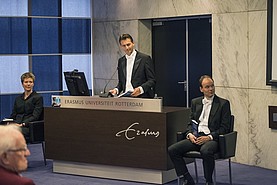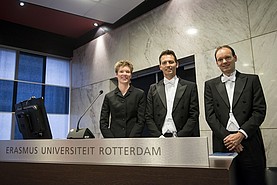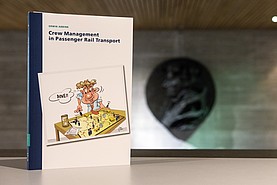PhD Defence: Crew Management in Passenger Rail Transport

‘Crew Management in Passenger Rail Transport’, by Erwin Abbink, describes how mathematics has helped the way NS creates the schedules for train drivers and train-managers significantly and also how advanced algorithms are applied in case of a disruption on the day of operation. This leads to stable labour relations, satisfied staff and also to a common understanding within NS, where both management and crew have scientific evidence on the best way to create attractive, cost effective and robust (personnel) schedules. It is clear that the so called “rondje rond de kerk” is an inferior solution. Due to the new systems in place, NS is able to make new schedules more rapidly and the systems in place will be used in the future for other planning systems.
Erwin defended his dissertation in the Senate Hall at Erasmus University Rotterdam on Friday, 24 October 2014. His supervisors were Professor Leo Kroon and Professor Albert Wagelmans and his co-supervisor was Dr. Dennis Huisman. Other members of the Doctoral Committee included Professor Will Bertrand (TUE), Professor G. T. Timmer (Vrij Universiteit) and Professor Erik van Heck (ERIM).
About Erwin Abbink

In 1995, Erwin Abbink obtained a Master of Science degree in Econometrics, at the University of Groningen (Rijksuniversiteit Groningen). In 2000 he obtained a Master of Science degree in Information and Knowledge Technology at Middlesex University in London.
Currently, he is a managing consultant innovation at Netherlands Railways. Main focus in this is on Decision Support Systems and Advanced Analytics. He has a broad experience in rail logistics and on disruption management for railway systems.
Based on his work, he has published papers in journals like Transportation Science, Interfaces, and Public Transport. He published on rolling stock assignment, shunting, crew scheduling, crew rostering and on crew dispatching.
In 2004 he was a finalist in the Daniel H. Wagner Prize for Excellence in Operations Research Practice with the paper: Abbink et al, “Reinventing Crew Scheduling at Netherlands Railways.” In 2008 he was winner of the Franz Edelman Excellence in Practice award with the paper: Kroon et al., “The New Dutch Timetable: The O.R. Revolution.” In 2009 he was awarded with the Best Applied Paper Award at the BNAIC, for the paper: Abbink et al., “Actor-agent based approach to train driver rescheduling.”
His main research interest during his work at Netherlands Railways is in applying Operations Research in practice.
Abstract of Crew Management in Passenger Rail Transport

Crew management in passenger rail transport is an important factor that contributes to both the quality of service to the railway passengers and to the operational costs of the train operating company. This thesis describes how the (railway) Crew Management process can be improved with the introduction of advanced decision support systems, based on advanced mathematical models and algorithms. We provide a managerial perspective on the change process, related to the introduction of these systems, and give an overview of the lessons learned.
We have shown that introducing decision support can give substantial improvements in the overall performance of a railway company. Within NS, the support for the Crew Management process has led to a stable relationship between management and train crew. In addition, the lead-time of the planning process is shortened from months to hours and NS is now able to perform scenario analyses, e.g., to study effects of adjusting the labour rules.
Also, NS can adjust their service when severe weather conditions are expected, by creating a specific winter timetable shortly before the day of operation. Finally, we also introduced a decision support system for real-time rescheduling of crew duties on the day of operations. This enables us to adapt the actual crew schedules very quickly. As a result, we reduce the number of cancelled trains and fewer trains will be delayed in case of unforeseen disruptions.
Photos: Chris Gorzeman / Capital Images


